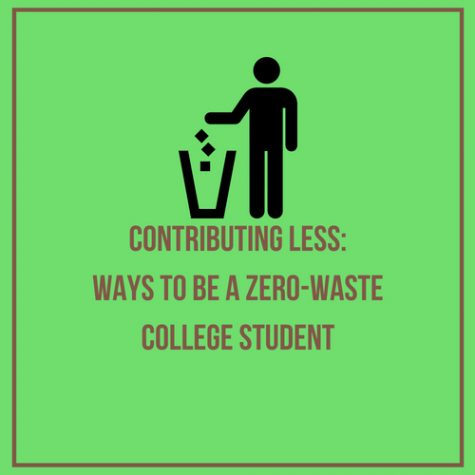
The zero-waste lifestyle is a movement to help lessen the human impact on the environment by integrating minimal-waste-producing changes into your daily routine. These kinds of changes aren’t hard, they just take a conscious effort to do regularly. It can be as easy as you’d like, which is perfect because, as students, we already have enough to keep track of.
Here are some ways you can incorporate being zero-waste with your college student lifestyle.
Glass or Biodegradable Straws:
There’s a recent movement by some major companies to either limit or completely stop their use of plastic straws because of the damage these items do to our environment, specifically the oceans. Plastic is not biodegradable, so wherever it ends up, it stays. Forever. According to TheLastPlasticStraw.Org, 500 million plastic straws are used and discarded every day in the United States.
One way that you can help limit your impact is by using glass or biodegradable straws. An eight-pack of glass straws can be purchased on Amazon for less than $10, and they come with cleaning brushes so that your straws will be clean after a normal wash, no matter what you’ve been drinking.
Beeswax Wrap:
Cling Wrap or Saran Wrap is another type of plastic that is typically used once or twice prior to being thrown out. A good zero-waste alternative is beeswax wrap. Eco-friendly and reusable (good for about a year with regular washes), beeswax wrap works the same as cling wrap in that you can use it to keep fruits and vegetables fresh. You can also cover a bowl or use it to wrap a sandwich. Other ways it can be used include as a placemat, to wrap up toiletries, or for when you’re on the run.
The good thing about beeswax wrap is that, if you don’t want to buy it, you can make it. There are YouTube tutorials and blog posts that show the step-by-step process so you can have a hefty supply whenever you need it.
Reusable Grocery Bags:
This is not a new concept, but using reusable grocery bags helps prevent all those plastic bags from ending up in our oceans and affecting wildlife. In 2016, the National Oceanic and Atmospheric Administration even released an image of a plastic bag found at the bottom of the Mariana Trench, which is the deepest location on Earth at seven miles below the surface.
The reusable grocery bags can be found at places like Publix, Target and Walmart and usually cost no more than $1. Some places even reward consumers for bringing their own bags, Whole Foods offers a rebate of up to ten cents for BYOB (bring your own bag). The bags are also versatile; instead of getting a plastic bag at every stop when you’re shopping, bring one or two reusable ones. Stores won’t mind putting your purchases in them and they’ll save you the hassle of having to carry a ton of bags when you’re in a really good shopping mood.
Bring Your Own Utensils:
This concept doesn’t cost anything unless you don’t already own cutlery. Go in your kitchen, open your utensil drawer and pack whichever ones you’ll need for the day in a lunchbox, in a small carrying case or even your new beeswax wrap! By bringing your own utensils, you’re helping to prevent millions of plastic utensils from being dumped into landfills. When you’re done, just wash them like any other dish and you’re good to go!
By incorporating these zero-waste tricks into your routine, you can help limit the impact plastic waste that affects our environment. There are plenty of resources that can be found online on how to learn more about the zero-waste lifestyle.
—
For more information or news tips, or if you see an error in this story or have any compliments or concerns, contact editor@unfspinnaker.com.











